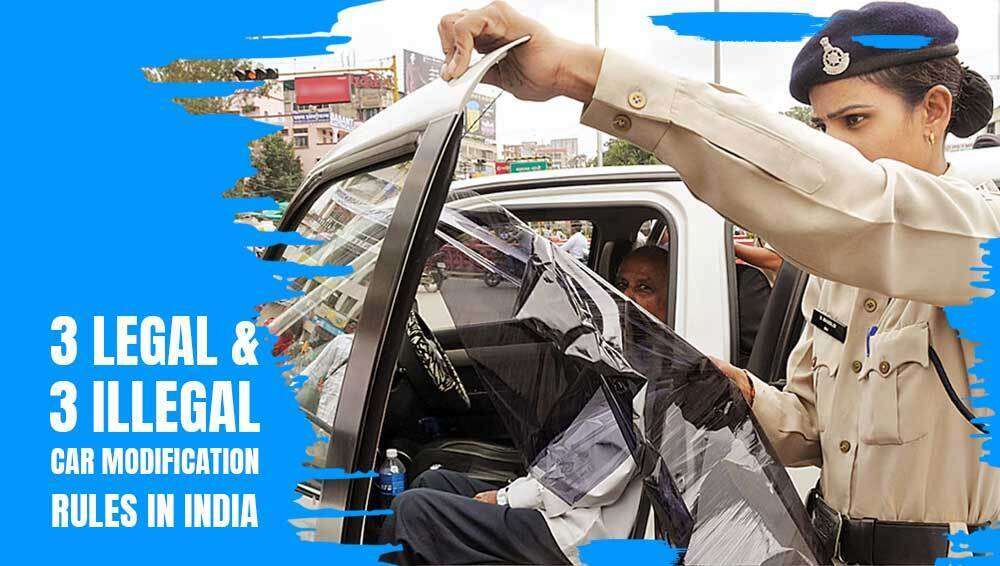
3 Legal And 3 Illegal Car Modification Rules In India
Soumi Roy 05-02-2025
Table Of Content
Being a car owner is fun especially if you are an enthusiast from the get-go. However, the fun factor of car ownership can be taken to the next level when a car is being modified in terms of performance and looks.
However, Indian authorities have put in place a bunch of rules that categorize certain car modifications legal and others, illegal. This blog in the following sections will outline 3 legal and 3 illegal car modifications Indian cars are often seen with in the roads.
Legal car modifications in India
Tire upgrades
So your car recently went for a vehicle inspection and the experts recommended that you consider changing the stock tires of your car with all terrain tires in a bid to ensure your car gets ample grip on tricky terrains that you often have to traverse while commuting from your home high up in the mountains!
But you are wondering whether the decision to upgrade the tires of your car will be opposed by the people at the RTO.
The good news is that, tire upgrades are considered as a legal modification as per the people working at the Indian motor vehicles department.
Suspension upgrades
The same rule applies to suspension upgrades. You can alter or modify the stock suspension of your car. However, make sure that the overall height and width of the car doesn’t fall too far away from the OEM specifications as that would render the entire car unfit for the Indian roads or at least, will lead to clashing car specifications that are pointed out in the RC of the vehicle.
Engine modifications
Altering the OEM settings of your car’s engine in a bid to make it either fuel-efficient or performance-oriented is a great way to personalize your car. However, make sure that you are not making your car unsafe to drive, to ride on, or to be around. Additionally, making the engine of your car extremely fuel efficient will render your car unusable on elevated roads. On the other hand, making your car’s engine extremely performance-oriented will increase your car ownership costs by several folds. Whatever you decide to do with your car’s engine, make sure that after the modification is done, you are getting it tested at the nearest AutoHealth vehicle inspection center in a bid to ascertain that the car’s engine specifications are within permissible limits.
Illegal car modifications in India
Tint with less than 50% visibility
Even the VIPS and VVIPs aren’t allowed to drive around in cars with fully tinted windows unless they have explicit permission from the RTO. So, if you are planning to install tint on your car windows, make sure that you are using tint films that let more than 50% light into the car cabin. This is a justified rule as driving around in a car with fully tinted windows, especially at night is dangerous since the driver becomes less aware of their surroundings.
Loud and melodious horns
The Indian authorities have penned a rule for all motorists that they cannot install horns in their vehicles that emit more than 100 decibels. It means that installing ornamental horns on cars will result in fines and frequent traffic stops! Hence, avoid installing extremely loud horns in your car.
Installing unauthorized number plates
Back in the day, people used to drive around in cars, flashing fancy number plates where the registration number of their car was written in a manner that often was almost incomprehensible. Gone are those days. Now, if you drive around in a car with a number plate that is not issued (and installed) by the RTO, you will be fined or your car might be seized as well. Remember this!
The car modification rules in India are confusing
`The rules designed to curb rampant car modifications in India are outdated and confusing. The presence of outdated car modification rules is the primary reason why there are no ‘active car scenes’ in India. Additionally, the presence of these so-called ‘anti-car modification rules’ is yet another reason why most car owners even refrain from making performance as well as safety-enhancing upgrades to their cars. Revising the car modification rules in India will inadvertently boost the aftermarket car parts industry. At the same time, modification studios and artists will get the encouragement needed to open up businesses as well!